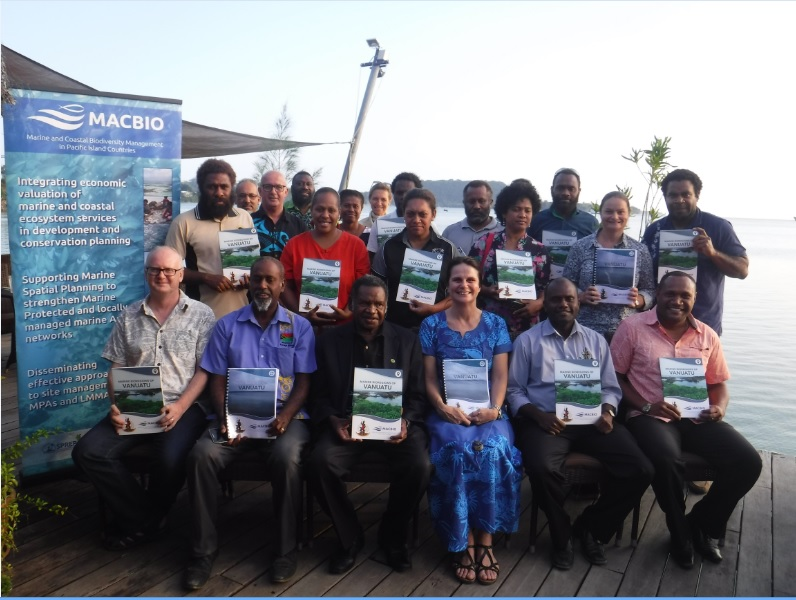Launch of Vanuatu Special & Unique Marine Areas Report & Vanuatu Marine Bioregions Report
3pm Thursday 19th July 2018
Au Fare, Port Vila
Press Release: Download English Version
VU Marine Bioregions Report: Download English Version
Biophysically Special, Unique Marine Areas of Vanuatu: Download English Version
Vanuatu is leading the Pacific, in terms of ocean management. It has led a shifting focus which is recognising that 98% of this nation is sea whilst only 2% is land. Vanuatu is the first country in the region to have an integrated, holistic Ocean Policy. This Policy allows for cross-sectoral coordination and collaboration to maintain and enhance the cultural, social and economic values that we, the people of Vanuatu, derive from our ocean.
This Policy arose from a decision made the Council of Minister's in 2014.

An integral, novel and innovative part of our Ocean Policy is the development of a nation-wide marine spatial plan for our ocean. This part of the Ocean Policy was also part of the 2014 Council of Ministers decision.This marine spatial plan will identify areas where certain developments should be promoted, areas where certain uses should be controlled, it will separate conflicting uses and identify special areas that need protection from extractive uses. The marine spatial plan will also be used to help uphold and support traditional marine resource management systems.
In the launching of the Ocean Policy in 2016, the Acting Prime Minister committed to a Marine Spatial Plan, which includes a network of Marine Protected Areas, by 2020. These commitments are also reflected in Vanuatu's Voluntary Commitments made at the United Nations Ocean Conference. This process is being guided by the Ocean Policy Implementation Sub-Committee –a multi-Ministerial Sub-Committee belonging to the National Committee on Maritime Boundary Delimitation which reports directly to the Council of Ministers. It is co-chaired by the Ministry of Foreign Affairs, International Cooperation and External Trade and Ministry for Climate Change Adaptation, Meteorology, Geohazards, Environment, Energy and the National Disaster Management Office.
This Committee has prepared many of the required technical building blocks required to better manage and protect our ocean through a marine spatial plan. This week they launched two more.
Last year a group of Vanuatu's marine experts described 109 special, unique marine areas in the country (both inshore and offshore). On Thursday 19th July, the Minister for Climate Change Adaptation, Meteorology, Geohazards, Environment, Energy and the National Disaster Management Office launched the report documenting this work.
The Minister said, "This report can help in decisions about licencing, permitting, coastal development, Environmental Impact Assessments and also in our national marine planning."
Whilst many parts of our marine environment are special or unique, we all know that every part of it matters and that it's all interconnected. Recognising this, in March this year, the Ocean Policy Implementation Committee convened Vanuatu's marine experts again to describe the entirety of Vanuatu's marine environment – from the coast out to the outer bounds of our Exclusive Economic Zone. The whole marine environment was defined into nine deepwater marine bioregions and seven reef-associated bioregions. On Thursday the Minister also launched a report describing how these bioregions were developed and the final resulting bioregions themselves.
The Minister notes that, "These bioregions will allow Vanuatu to comply with international commitments such as an "ecologically representative" network of Marine Protected Areas as in the Convention on Biological Diversity.".
Earlier this week, the Ocean Policy Implementation Sub-Committee members discussed ocean zone placement guidelines-to help guide the nation's decisions about where to put different types of ocean zones. And they also discussed the need for national consultations to ensure everyone's information is considered in the planning process, including information that people wish to share about areas of cultural and traditional value. 98% of our country is sea, and yet, so far, integrated spatial planning for our ocean is missing. We are an ocean nation. Our future lies in our marine resources and so cross-sectoral forward planning for their sustainable use is imperative.
With these reports, and this week's deliberations, the final, technical building blocks are in place for the country to start national discussions – with all sectors, with communities, with all levels of government, with traditional owners, with all other Vanuatu citizens - about what a marine spatial plan for the country should look like.
Congratulations to the members of the Ocean Policy Implementation Committee for their hard work. Thanks to the MACBIO project for their ongoing support. The MACBIO project is funded by the International Climate Initiative (IKI) of BMU and being implemented by GIZ in partnership with SPREP and with technical support of IUCN's Oceania Regional Office.
